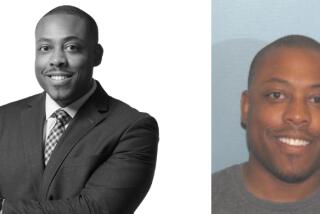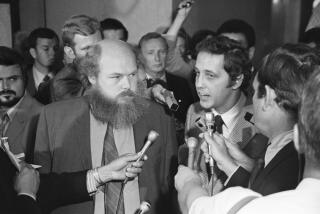Bribery case brings down legal legend
- Share via
ATLANTA — Over the years, Richard F. “Dickie” Scruggs earned a reputation as one of the nation’s wiliest and most powerful plaintiff’s attorneys. Along the way he was hailed as a champion of the little guy. He was also derided as a scoundrel who would stoop as low as necessary to get his way -- and fatten his bank account.
On Friday, his critics rested their case in the court of public opinion. The storied Mississippi lawyer -- the man who engineered the monumental tobacco settlement of the 1990s, then took on Big Insurance after Hurricane Katrina -- pleaded guilty to a federal charge that he conspired to bribe a judge.
It was the second time this week that an immensely powerful man was brought low by temptation and transgression. In the case of New York Gov. Eliot Spitzer, it was a sex scandal involving call girls. To some observers, Scruggs’ case was more baffling: A man who had amassed one of the most formidable fortunes in Mississippi was indicted for orchestrating a $50,000 bribe to a judge deciding how to divide $26.5 million in attorneys’ fees.
It was money he almost certainly didn’t need.
“Dick Scruggs’ genius was he figured out how to make a lot of money doing a lot of good for a lot of people,” said Matt Myers, president of the Campaign for Tobacco-Free Kids, a Washington advocacy group.
“The irony is that . . . the lawyer who revealed how many other lawyers buried documents and were complicit in the tobacco industry’s cover-up is the only one who is likely to go to jail,” Myers said.
Scruggs’ guilty plea came during a hearing Friday in federal court in Oxford, Miss., where his law firm commands a prominent place in the central square. Sidney A. Backstrom, an attorney in Scruggs’ firm, pleaded guilty to a similar conspiracy charge.
Prosecutors are to recommend a five-year sentence for Scruggs and 2 1/2 years for Backstrom. Without the plea deal, Scruggs could have faced up to 75 years in prison. A sentencing date has not been set.
The Mississippi Bar Assn. said it would seek “immediate suspension and ultimately disbarment” for the two.
“It’s very troubling that someone of Scruggs’ legal ability and stature would stoop to conspire to influence a judge’s decision,” said Robert R. Bailess, the bar president.
Scruggs’ son, attorney David Zachary Scruggs, is also charged in the conspiracy but did not enter a plea Friday. A trial is scheduled for March 31.
A brother-in-law of former Sen. Trent Lott (R-Miss.), Dickie Scruggs moved in powerful circles. The legendary lawyer flew around on a private jet and gave lavishly to political candidates and the University of Mississippi, which named a music building after him.
The case that proved to be Scruggs’ undoing came after Katrina struck the Mississippi Gulf Coast in August 2005. Thousands lost their homes, including Scruggs, whose beachfront house in Pascagoula was obliterated.
He and other lawyers formed the Scruggs Katrina Group and began signing up residents who felt that insurance companies had improperly denied their claims. The group reached an $80-million settlement with State Farm, one of the largest insurers on the coast, but ended up back in court over the disbursement of the legal fees.
In November 2007, federal prosecutors named Dickie Scruggs, Zach Scruggs, Backstrom and two other men in the scheme to bribe Circuit Judge Henry L. Lackey. Their goal, prosecutors said, was to get Lackey to rule in their favor in the legal-fee dispute.
Things apparently went wrong from the beginning. Lackey reported a “bribery overture” to federal officials, then worked undercover to help investigators expose the scheme.
Two of the men pleaded guilty and began cooperating with prosecutors. One of them, attorney Timothy R. Balducci, told the FBI he paid Lackey the bribe on instructions from Scruggs and Backstrom.
Soon after Scruggs was charged, Democratic presidential contender Hillary Rodham Clinton canceled a fundraiser at his Oxford home. Scruggs’ law firm withdrew from the remaining Katrina cases.
Scruggs’ actions were inexplicable because the amount of money at stake was a pittance compared to his wealth, said New York University law professor Stephen Gillers, a legal ethics expert.
“You ask why would someone do this . . . to risk so much for so little. . . . Because they think they can,” Gillers said, noting that Scruggs was hardly the only lawyer to have run afoul of the law -- merely one of the most famous to do so.
Scruggs’ indictment, he said, was one of several situations, including the fall of Spitzer, that prompted him to come up with a new definition of cognitive dissonance: “You know it’s true, but you still can’t believe it.”
James R. Robie, a Los Angeles attorney who is representing State Farm in dozens of Katrina-related cases, speculated that Scruggs “became completely intoxicated by power.”
Scruggs, 61, was born in modest circumstances in Brookhaven, Miss. After serving as a fighter pilot in the Navy, he earned a law degree from the University of Mississippi in Oxford.
In his first significant case, he represented shipyard workers who had been exposed to asbestos. Scruggs earned millions from asbestos litigation. But it was his assault on Big Tobacco in the 1990s that made him famous. Scruggs orchestrated one of the largest civil settlements in American history, winning nearly $250 billion from the industry. The fees awarded to the plaintiffs’ lawyers came to more than $13 billion. Scruggs’ share of the pot was at the very least in the hundreds of millions.
There are cases that make lawyers’ careers, but this was something more. It made Scruggs a star in the legal world and a character in “The Insider,” a 1999 movie about the tobacco litigation.
Former Mississippi Atty. Gen. Mike Moore, who worked closely with Scruggs on the tobacco cases, said the disgraced lawyer had done a tremendous amount of good for public health.
“Today’s events don’t change that a bit,” Moore said. “He’s a very good man who made a mistake he’ll pay for the rest of his life.”
But Scruggs also left a trail of critics.
David Rossmiller, an attorney in Portland, Ore., whose Insurance Coverage Law Blog has focused on Scruggs’ recent troubles, found it unsettling that the tobacco litigation relied in part on an insider who took company documents.
Other attorneys who worked with Scruggs alleged that he shortchanged them on fees.
Today, Mississippians are wondering what effect Scruggs’ guilty plea will have on homeowners’ remaining cases against State Farm, in which millions of dollars is potentially at stake.
Rossmiller thinks the insurance giant will benefit.
“It affects the potential jury pool for a civil case, whether anybody wants to admit that or not,” he said.
After the guilty plea was announced, Aaron Condon, a law professor emeritus at Ole Miss, could not help feeling sad as he drove past the music hall named after his former student.
“It’s like every other great tragedy where the hero turned out to have feet of clay,” Condon said. “I would never have thought that he would be so lacking in judgment as to risk his career and his future like this.”
--
jenny.jarvie@latimes.com
henry.weinstein@latimes.com
--
Fausset and Jarvie reported from Atlanta, Weinstein from Los Angeles.
More to Read
Sign up for Essential California
The most important California stories and recommendations in your inbox every morning.
You may occasionally receive promotional content from the Los Angeles Times.














